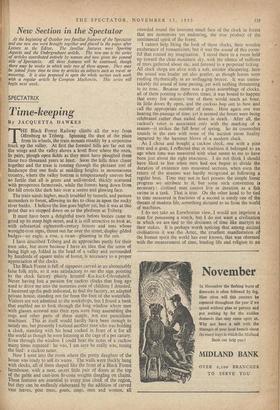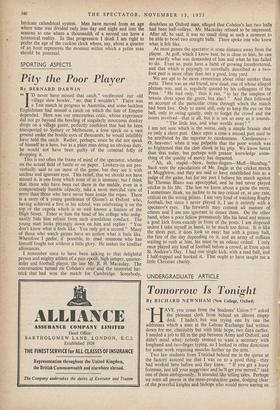SPECTATRIX
Time-keeping
By JACQUETTA HAWKES THE Black Forest Railway climbs all the way from Offenburg to Triberg. Spinning the dust of the plain from its wheels, the train mounts steadily by a serpentine track up the valley. At first the forested hills are far out on the wings and the valley shows a level floor where the oxen. In pairs, plough open fields as they must have ploughed them these two thousand years at least. Soon the hills draw closer together and the train is running through the pleasant sort of landscape that one finds at middling heights in mountainous country, where the valley bottom is tempestuously uneven but so fertile that all is green and well-tended, thickly scattered with prosperous farmsteads, while the forests hang down from the hill crests like dark hair over a serene and glowing face.
The train winds higher, much troubled by tunnels, and pasture surrenders to forest, allowing its firs to close in upon the rocky river banks. I believe the line goes higher yet, but it was at this point that we stepped down on to the platform at Triberg.
It must have been a delightful town before lorries came to grind up its steep high street, and it is still attractive to look at, with substantial eighteenth-century houses and inns whose wrought-iron signs, thrust out far over the street, display gilded badges—an eagle, a rose, a swan—gleaming in the sun.
I have described Triberg and its approaches partly for their own sake, but more because I have an idea that the sense of being high up, folded in the head of a valley and surrounded by hundreds of square miles of forest, is necessary to a proper appreciation of the clocks. , The Black Forest is full of signposts carved in an abominably false folk style, so it was satisfactory to see the sign pointing to the clock factory plainly lettered Kuckuck-Uhrenfabrik. Never having lost a passion for cuckoo clocks that long ago used to drive me into the nurseries even of children I detested, I hastened up the path indicated, to find the factory, an adapted private house, standing not far from the foot of the waterfalls. Visitors are not admitted to the workshops, but I found a bank that enabled me to look through the long window where men with glasses screwed into their eyes were busy assembling the cogs and other parts of these simple, not too punctilious machines. This in itself would hardly have been enough to satisfy me, but presently I noticed another man who was holding a clock, standing with his head cocked in front of it for all the world as though he were listening at the cage of a pet canary. Even through the window I could hear the notes of a cuckoo many times repeated : he was, I am sure he really was, tuning the bird : a cuckoo tuner.
Now I went into the' room where the pretty daughter of the house was ready to sell its wares. The walls were thickly hung with clocks, all of them shaped like the front of a Black Forest farmhouse, with a neat, secret little pair of doors at the top of the gable and cast-iron fir-cone weights dangling on chains. These features are essential to every true clock of the region, but they can be endlessly elaborated by the addition of carved vine leaves, -pine trees, goats, stags, men and women, all crowded round the innocent small face of the clock in forms that are monstrous yet endearing, the true product of the sentimental spirit of the forest.
I cannot help liking the look of these clocks, their wooden exuberance of romanticism; but it was the sound of this room- ful that roused my imagination. I stood there in a room held up toward the clear mountain sky, with the silence-of millions of trees gathered about me, and listened to a perpetual ticking. All clock shops are alive with a soft, sinister whispering: here the sound was louder yet also gentler, as though leaves were rustling rhythmically in an unflagging breeze. It was unmis- takably the sound of time passing, yet with nothing threatening in its tone.. Because there was a great assemblage of clocks, all of them pointing to different times, it was bound to happen that every few minutes one of them would reach an hour, its little doors fly open, and the cuckoo hop out to bow and call the appropriate number of times. Here again one was hearing the passage of time, yet it seemed the hours were being celebrated rather than nailed down in death. After all, the cuckoo's voice is associated only with the marking of a season—it strikes the full hour of spring. So its counterfeit sounds in the ears with none of the auction room finality imparted by the hammer blows of a modern clock.
As I chose and bought a cuckoo clock, one with a pine tree and a goat. I reflected that in tradition it belonged to an age when time was measured with what seems to me to have been just about the right exactness. I do not think I should have liked to live when men had not begun to divide the duration of existence into measured sections, when even the return of the seasons was hardly recognised as following a regular beat. Time may not in fact possess the simple linear progress we attribute to it, but some such convention is necessary : Civilised man cannot live in duration as a fish swims in a tank. That is true. On the other hand to be tied to time measured in fractions of a second is surely one of the threats of modern life, something dictated to us from the world of machines.
I do. not take an Erewhonian view, I would not imprison a, man for possessing a watch, but I do not want a civilisation in which we are tied to the divisions of time like martyrs to their stakes. It is perhaps worth npticing that among ancient civilisations it was the Aztec, the 'cruellest manifestation of the human spirit the world has ever known, that was obsessed with the measurement of time, binding life and religion to an Intricate calendrical system. Men have moved from an age where time was divided only into day and night and into the seasons to one where a thousandth of a second can have a tyrannical reality. In that progression I think I am right to prefer the age of the cuckoo clock where, say, about a quarter of an hour represents the moment within which a polite man should be punctual.

































 Previous page
Previous page